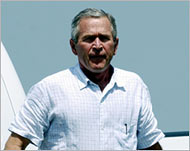Sunnis caution against federal Iraq
Iraq’s Sunnis have warned that while a federal text might be approved by the constitutional charter drafting committee and parliament, it will nevertheless be rejected by Sunni voters in a referendum scheduled for October.

“The people of Iraq will defeat a federal constitution in the October referendum,” Sunni committee member Saleh al-Mutlaq said on Friday.
The Sunnis’ cause received support from across Iraq’s sectarian divide, with thousands of followers of Muqtada al-Sadr, the Shia cleric who led a six-month uprising against US-led forces last year, demonstrating against a federal constitution after the main weekly Friday Muslim prayers.
Under the terms of interim legislation, the constitution fails if two-thirds of the voters in any three of Iraq’s 18 provinces reject the text in the referendum.
Sunnis form a majority in Anbar, Tamim and Salaheddin provinces.
Fighters’ diktat
In a related development, Aljazeera said, six armed Iraqi Sunni groups have called on Muslims in Iraq to register their names to vote against the draft constitution and thwart “the US scheme in Iraq“.
In a statement issued on Friday, the groups urged Muslims to reject the draft constitution as an act of what they called “a kind of jihad (holy war) and a religious responsibility”.
The six groups which signed the statement are Thwart al-Ishrin (1920) Revolution Brigades, Jaish al-Mujahdin, al-Jaish al-Islami (Islamic Army) in Iraq, the Islamic Front for Iraqi Resistance, Islamic Movement for Iraqi Resistance, and Asaib Ahl al-Iraq, according to Aljazeera.
 |
|
The US army wants Iraqi security |
On the ground, seven Iraqis died in attacks, including three Sunni members of the Iraqi Islamic Party, who were gunned down when they were putting up posters to call for participation in the parliamentary elections due in December after the ratification of the new constitution.
Party spokesman Noureddine Hayali said the three were kidnapped in the main northern city of Mosul and later executed.
An Iraqi police source said two Iraqis were killed and another and wounded when a roadside bomb planted on the main road west of the northern city of Tikrit exploded.
In the northern Iraqi city of Kirkuk, fighters assassinated the Arab member at the local council Omar Nayif in front of his house.
In Baquba, Iraqi police source said that a US military vehicle was destroyed in a car bomb blast targeting a US patrol in al-Hadid area.
Immense pressure
The US administration has put immense pressure on the drafting committee to stick to the target date for fear that any loss of momentum in the political process will play into the hands of Sunni Arab fighters.
But a former US official, who served as chief adviser in the drawing up of an interim basic law last year, said parliament could extend the deadline “as many times as they like”.
“There’s no reason they couldn’t do this again,” Noah Feldman, the official, said.
|
“The casualties we’re taking, the billion dollars a week we’re putting in there, the kind of commitment we’ve got, we’re not going to be able to sustain it” Chuck Hagel, |
With the US death toll climbing, support at home plunging and a stalemate over a constitution stalling the political process, the Iraq war is casting a darkening cloud over George Bush’s presidency.
The failure of Iraqi negotiators to nail down a charter by last Monday’s deadline was only the latest bad news for Bush, who is under mounting pressure to set a timetable for withdrawing the 138,000 US troops in Iraq.
Signs of alarm are now starting to surface within Bush’s Republican Party, which is fearful that discontent over the war could loosen, if not threaten, its solid hold over Congress in the November 2006 elections.
Rising casualties
Party stalwarts such as Senator Chuck Hagel of Nebraska have become increasingly outspoken about the administration’s policy of toughing it out against an uprising raging 28 months after the overthrow of Saddam Hussein.
“The casualties we’re taking, the billion dollars a week we’re putting in there, the kind of commitment we’ve got, we’re not going to be able to sustain it,” Hagel told CNN on Thursday. “Public opinion won’t allow it.”
 |
|
Bush’s popularity has been hurt |
With US deaths in Iraq rising to 1850 – including more than 50 in August alone, making it one of the bloodiest months yet for American troops there – Bush’s popularity has continued to slide in the polls.
Fewer than four in 10 Americans approve of the way he is handling Iraq.
Now 54% say the war was a mistake, and 56% believe some or all US troops should come home, according to a Gallup poll published last week.
Nine months after winning a second term by a surprisingly convincing margin and spearheading a strong Republican showing in legislative elections, Bush has seen his approval ratings sink to around 45%.